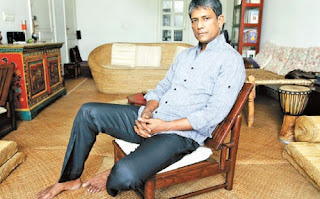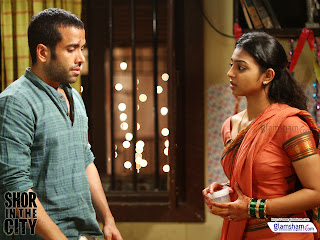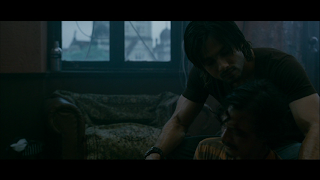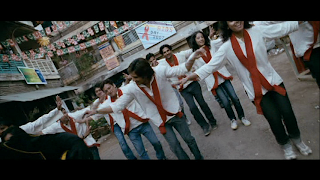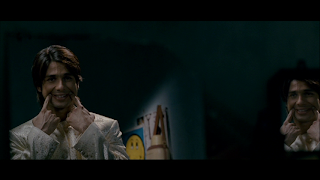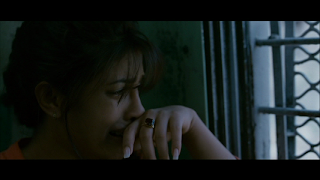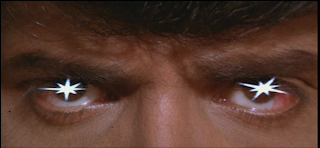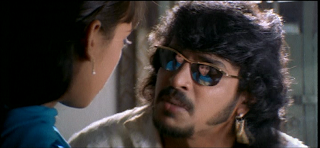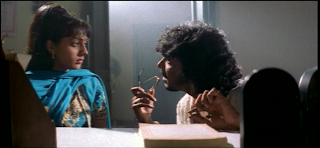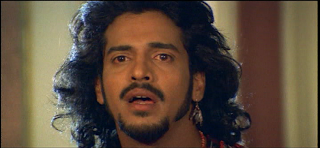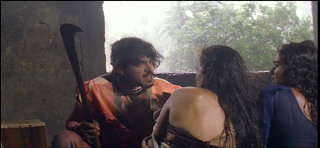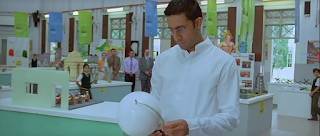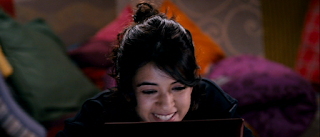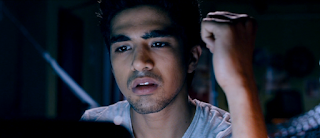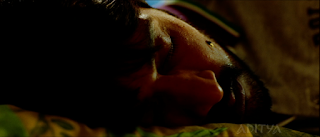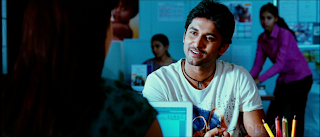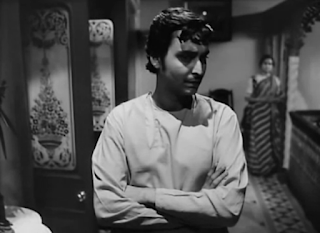I knew full well going into Student of the Year that this would not become a new favourite. For the longest time, I was prepared to simply ignore the film. I know my tastes my now, and having watched a fair bit of Karan Johar's oeuvre, I know his films aren't my thing. But curiosity won over - the fact he was making a film with nothing but newcomers meant that this had potential to be something fresh, and if nothing else, at least I'd be introduced to a bunch of new faces.
I wasn't surprised that I didn't love the film, but I was surprised at the laser-like accuracy with which my brain could pin-point the things I disliked, and why I disliked them. Some may accuse me of going in with a chip on my shoulder, because I was not a Karan Johar fan to begin with, and they'd probably be right on that. Still, there were things that I liked, and I'm prepared to give credit where credit's due, even if this review will be lopsided towards the negative. (Because of this, the post will be quite detailed so be warned for SPOILERS.)
The plot is precisely what you can deduce from the posters. St Teresa, an elite school, holds its annual Student of the Year competition, which ends up creating tensions between some of the school's top students. Rohan (Varun Dhawan, David's son) is the resident rich, cool kid, who at first butts heads with newest student, the ambitious Abhimanyu (Sidharth Malhotra) but soon develops a friendship with him. Rohan mistreats his girlfriend Shanaya (Alia Bhatt, Mahesh's daughter) and eventually a love triangle forms between Rohan, Shanaya and Abhimanyu, and the competition is only heating up...
The very first problem I had with the film was the highly objectionable portrayal of our heroine in the film as a largely hyper-superficial, consumerist fashionista or the other female principals as people who scheme, trying to win men and/or influence. This I precisely the sort of thing
I ranted about last month, and it still gets my goat in a big way. Shanaya is introduced with a song highlighting her richness and fashion-obsessiveness. Her best friend Shruti
(Mansi Rachh), it is implied, only hangs out with her because of the connections and her other relationships to women are an unhealthy one to her mother, and a rivalry with Tanya (Sana Saeed, ie Little Anjali from KKHH, all grown up) over Rohan's affections. I could forgive all of this if the character wasn't so supremely under-written. There is a scene where Abhi lovingly describes her personality, but at no point does the movie actually show us where he draws these conclusions from. At best you could describe Shanaya's character as a bit dim, and this is at times played up for laughs. But she's pretty, so of course the boys are in love with her! As for Shruti, she has short hair and doesn't seem to be obsessed with fashion, so naturally she's almost like a boy and Tanya's an exaggerated vamp stereotype. Yawn.
Of course, if Shanaya is unlikable, then so are the boys jostling for her attention. Rohan is introduced with an obnoxious pseudo-rockstar image (shirtless, playing noisy guitar) and quickly we learn his rich bratty ways are sourced from his father being a horrible person. He wants to become a musician, but I never learnt why this is his true passion. He starts out an asshole, and is still an asshole by the end. This is where credit to Varun Dhawan has to be given. There is nothing in the writing of the character to make me sympathetic to him (sure, his father is an ass, but does he have to follow?) but somehow I still ended up liking him better of the two.
![]()
Abhimanyu gets the whole school swooning over his amazing charms from the get-go, but there is still little to care about him for. His backstory gets stuffed with a lot of filmi junk, which I suppose is meant to give him an underdog feel: he's not from the best family, he's an orphan, he has nobody but his grandmother.. Still, he's a pompous guy, not as clueless as Rohan, but not all that much better. The love story between him and Shanaya is based on very little but a few conversations, a couple of meaningful looks and, I suppose, the fact that they are both attractive.
That's the thing about Karan Johar's cinematic universes. This one is so painfully shallow it's almost funny. We get a lot of gratuitous slow motion shots of well-trained abs and bulging chest muscles, slightly less of loving shots of flowing hair and twirling dresses and this is all great and wonderful as aesthetics go, but you know what I'd like more of? Acting, charm, story, characterization.. I know a certain fascination with the glamorous lives of the ultra-rich is a modern Hindi film staple (from the 1990's onwards), and this kind of superficial love of fashion and objectification of bodies goes hand in hand with this trend, so it's to be expected, but its novelty value has worn off pretty quickly.
There's nothing wrong with these things individually, but when they stack up, it doesn't make for great cinema. I can enjoy the gratuitous body display in entertainers, but when combined with flat characterizations, not the strongest acting abilities and other annoyances, the end result becomes unappetizing.
Then there are the gay jokes. To hammer through the idea that Abhi and Rohan share the most epic
dosti imaginable, we are treated to every possible flirtation with homoeroticism you could possibly conjure up. There's the running joke of Abhi asking Rohan, "You're not going to kiss me, are you?" whenever their unmanly friendship feelings emerge, and Rohan typically counters it with, "I'm not going to even hug you!", right before he goes in for that all-important meaningful hug. Then there are the many meaningful looks, the casual sleepover Abhi has at Rohan's house and of course, the limp chemistry they have with Shanaya, compared to what they have with one another.
You might think it's pretty rich of the girl who
loves Main Khiladi Tu Anari, the absolute epitome of homoerotic implications in Hindi cinema, to harp on SOTY for essentially the same phenomenon. And yet I will, because what separates the two is the wink-and-nudge acknowledgment at every step of the way in SOTY at what they're doing. In MKTA, they did not set out to make an unintentionally hilarious homoerotic
buddypyaari film - they set out to make a genuine 90's masala with some male friendship at the center of it, and whatever else might have intended, laughing at homosexuality was not the goal. There's also very little of that most aggravating of modern phenomenons, the "gay scare" humour. It's the sort of jokes where one of not laughing at gay people specifically, but at the potential of something happening between two members of the same gender, after which they quickly claim their heterosexuality. Far from normalizing homosexuality (which some may think it does), it actually does the opposite, since everything hinges on the denial of homosexuality. "I love my friend, no homo, because for it to be even a little bit homo would be weird and gross, ew."
The entirety of Dostana (another film let down by bad writing and lazy characterization) was built on this type of joke, so it's not like there's anything radically new about it. While it can be amusing and even cute at times, I wish dearly it wasn't in abundance here, because tucked away deep inside this sort of lazy comedy is what could've been the emotional heart of the SOTY - an actual, genuine, honest-to-god love story between two men. The two male leads have clear chemistry with one another. Not a whole lot of the plot would need to change; the flimsy characterization given to Shanaya almost seems to confirm the existence of the romance as subtext. The love triangle is never
truly about her, and at one point the film gives her a rare moment of individual agency by having her get upset that the boys are squabbling over her. "You just want to own me!" she yells at them, because it's true: she's little more than a pretty accessory to both of them.
Closely related is the character of the school's Dean, responsible for the inane Student of the Year competition, played by Rishi Kapoor (who is good in the role despite writing). He is gay, but not exactly a positive example of representation - essentially he combines the stereotypes of the lonely, tragic homosexual character as well as the flamboyant comedy gay character who flirts with demonstrably straight men. Is it good that he exists at all? I'm not sure. Towards the end, it's almost as if he's the film's unofficial villain, and at no point is society's homophobia implied as the reason for his lonely fate. It's merely given that he can never be with somebody, because he's gay, and only straight people are afforded the luxury of loving partnerships. Homosexuality can be flirted with, because boys will be boys and boys will have close friendships (unlike girls, of course!) that teeter on the edge of romantic, but if you actually are gay, your life will be self-denial and tragedy.
All in all, it just makes you sad.
Possibly the sole shining point of the film are its ensemble cast of secondaries. Besides Shruti and Tanya, there's the lovable fool Jeet (Sahil Anand), who is also a hanger-on friend/lackey of Rohan's and the nerdy, heavy-set Kaizaad Sodabottleopenerwala or "Sudo" (Kayoze Irani, son of Boman). Manjot Singh, who played young Lucky in
Oye Lucky Lucky Oye, plays Dimpy, an assistant of the coach and is very likable in the role. As expected, Jeet is subject to a lot of "haha, he's so dumb!" type jokes, and a lot of eye-rolling from his so-called friends, and Sudo is the butt of many a fat joke, but somehow these characters rise above the slots given to them and become a bit more real and relatable than the flawless, cool but flat main characters. Sudo particularly gets one true high point of the film, which really makes me want to see more of Kayoze Irani as an actor.
I also have to give credit to Johar for the narrative choices and the pleasing look of the film. The story is framed by the secondary characters telling the story of their past, in the present, which allows for a slow reveal of events. It gives the secondaries more room to impress, which I liked a lot. The only problem with this was that it made me hope for a better story than what eventually turned out to be the main plot of the film.
Then there are the few fantastic song numbers the film contains, mainly the wedding song Radha and the disco number The Disco Song, the latter of which has some nice cameos, and overall a good tune. The other songs on the soundtrack I'm not huge on, but these two are just fantastically filmed and have nice choreography so I could easily see myself rewatching them.
Student of the Year certainly did what I thought it would, introducing me to new faces who might be the big stars of tomorrow's Hindi films. I hope this write-up doesn't read as merely scathingly snarky, as that was not my intention - I think at a different point in my life I would've enjoyed a film like this, but as I am right now, I find myself distant from the characters and finding very little to enjoy in their stories. It doesn't help that the film seems to almost revel in its shallowness. Still, it's far from being without entertainment value, and even contains a couple of pretty solid performances. So if you're curious despite everything I detailed in this post, I'd give it a rental.
(For a more positive take, should you want one, there is
Filmi Girl's review.)





